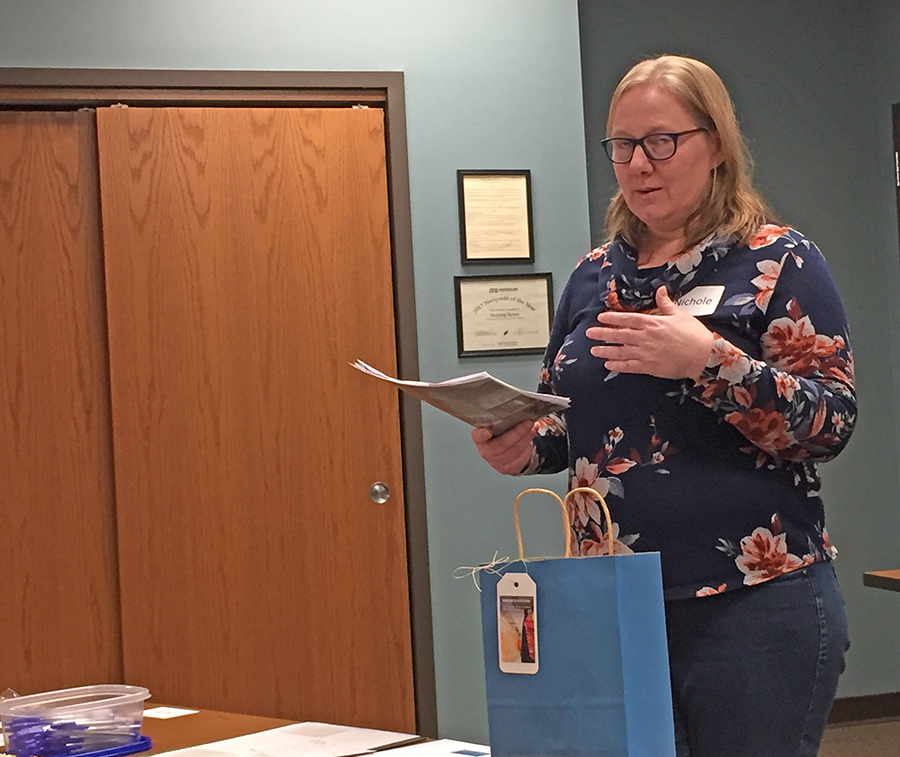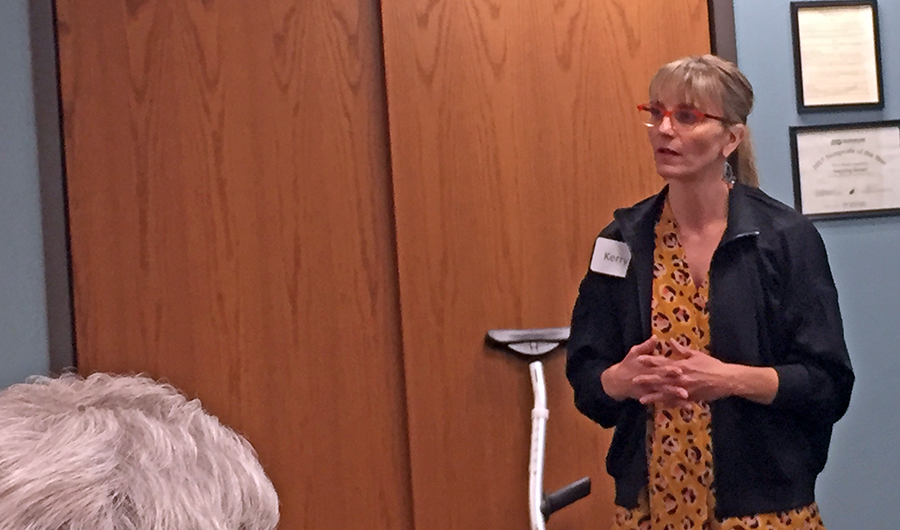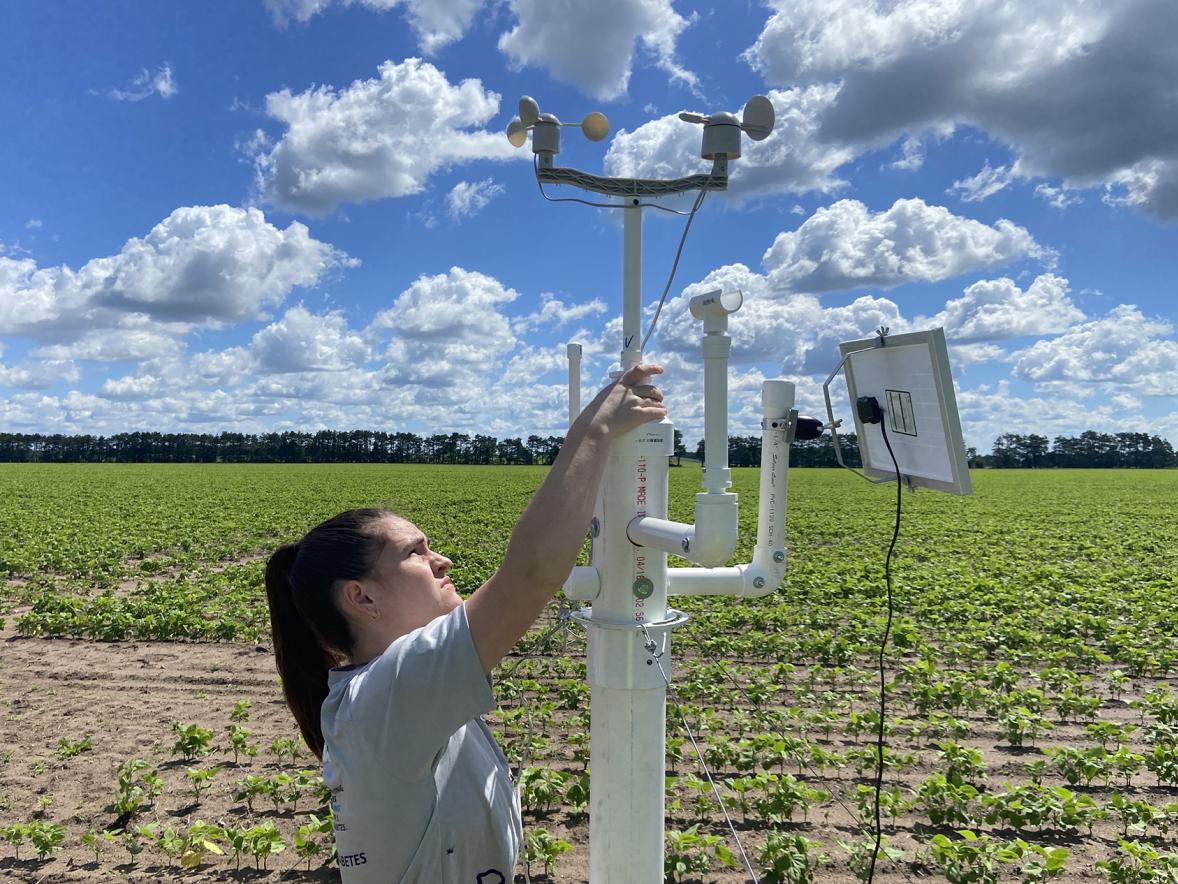Homeless and unemployed, Nichole Manson of Menomonie finally realized she needed to start the road to recovery.
Addicted to drugs and alcohol, she first started using alcohol for the thrill and by 13 years old was blacking out from overconsumption. By 18 years old, she knew she had a problem with alcohol and drugs. “I had two ambulance rides for alcohol poisoning,” she said, speaking at the Stepping Stones of Dunn County food pantry in Menomonie. “Waking up in the ER from a blackout is no fun and I did it twice.”
After her family disowned her, which Manson praised them for doing, she found herself living with friends and realized she had to face her chemical dependency.
As she was recovering, she needed help from a food pantry and was on FoodShare now. She would get food at the pantry, but have no idea how to cook it, and had to learn through reading food blogs. “I was surprised how unprepared I was to eat healthy when I had to make my own meals,” she said.
One of Manson’s dreams is to create a space where people can come together at a Kindness Kitchen and help learn from each other how to grow, prepare and cook food.

Manson was one of the speakers at the event Kindness Kitchen: Empowering Changes Through Empathy planned by the Initiative for the Creation of the University of Wisconsin-Stout Center for the Study and Promotion of Health and Wellbeing.
Kerry Peterson, UW-Stout associate professor in the food and nutrition department, shared expertise on healthy ingredient substitutions, healthy shopping and cooking on a budget.
Black pepper, garlic, cumin and chili powder are low-cost spices to be used in place of salt, Peterson said. She encouraged people to drink water or tea, which is lower in cost and calories compared to sodas and juice.
“Frozen vegetables are inexpensive and often on sale,” Peterson said. “Add these to meals to increase servings and boost nutrition.”
Canned fruits should be in their own natural juice and vegetables should not have salt added. However canned vegetables and canned meats can be rinsed to reduce the salt content, Peterson said.
Vegetables can be purchased in season and frozen for later use if freezer space is available, she noted.
Plant protein sources such as beans or lentils can be added to ground meats to bulk up meals, reduce fat and increase the fiber and cut costs, Peterson said.
For on-campus students who are on a tight budget, whole wheat noodles can be boiled in a hot pot and provide an inexpensive meal. Add in vegetables to increase nutrition and spices to improve flavor.

“It’s important, especially for college students, to eat a balanced breakfast. They will feel better and less hungry throughout the day,” Peterson said. “They should try to include protein in their breakfast such as toast with peanut butter, an egg or yogurt and fruit.”
Students should take snacks with them including fresh fruits and low-fat cheese sticks, or granola bars with healthy fats and proteins, to prevent hunger and loading up on calories at the end of the day.
Some substitutions for healthier foods when baking include using whole wheat flour, which is higher in fiber, instead of white. Unsweetened applesauce, low-fat Greek yogurt or ripened bananas can be substituted for oil in baking recipes, which cost less and have fewer calories.
Peterson also encouraged students in need to use the on-campus Helping Hand food pantry on the fourth floor of Bowman Hall. The food pantry opened in April. The food pantry has fresh fruits and vegetables and many shelf-stable foods, personal hygiene items, laundry supplies and school supplies.
Cristy Linse, director of the initiative to create the UW-Stout center to study health promotion and wellbeing, said she first thought of the idea to talk about food insecurity and hunger after she met Manson and they started talking while walking their dogs at a local dog park.
“When we talk about food security, social factors support the choices we make,” Linse said. “When we’re talking food insecurity, sometimes eating healthy is a barrier because people don’t have the (kitchen utensils) to cook healthy.”
The initiative is seeking donations to become self-funded and provide more educational opportunities in the community.
Also speaking at the event were Kris Pawlowski, assistant director and Stepping Stones food pantry coordinator, and Ann Schram, coordinator and supervisor of the Free Clinic of the Greater Menomonie Area.
UW-Stout offers bachelor degrees in dietetics, food science and technology and a master’s degree in food and nutritional sciences.
###
Photos
Kerry Peterson, UW-Stout associate professor in the food and nutrition department, talks about healthy shopping and cooking on a budget.
Nichole Manson of Menomonie shares her story of trying to learn to eat healthy on a budget. Manson dreams of starting a space where people help each other to learn to grow, prepare and cook food.







